Avocado oil is one of the healthiest oils you can use — it supports your heart, skin, and overall wellness thanks to its rich blend of monounsaturated fats, antioxidants, and vitamin E.
Made from the creamy pulp of avocados, this vibrant green oil has quickly become a science-backed superfood prized for both cooking and skincare. Researchers have found that avocado oil can help lower bad cholesterol, fight inflammation, boost nutrient absorption, and even protect brain and skin cells from oxidative stress.
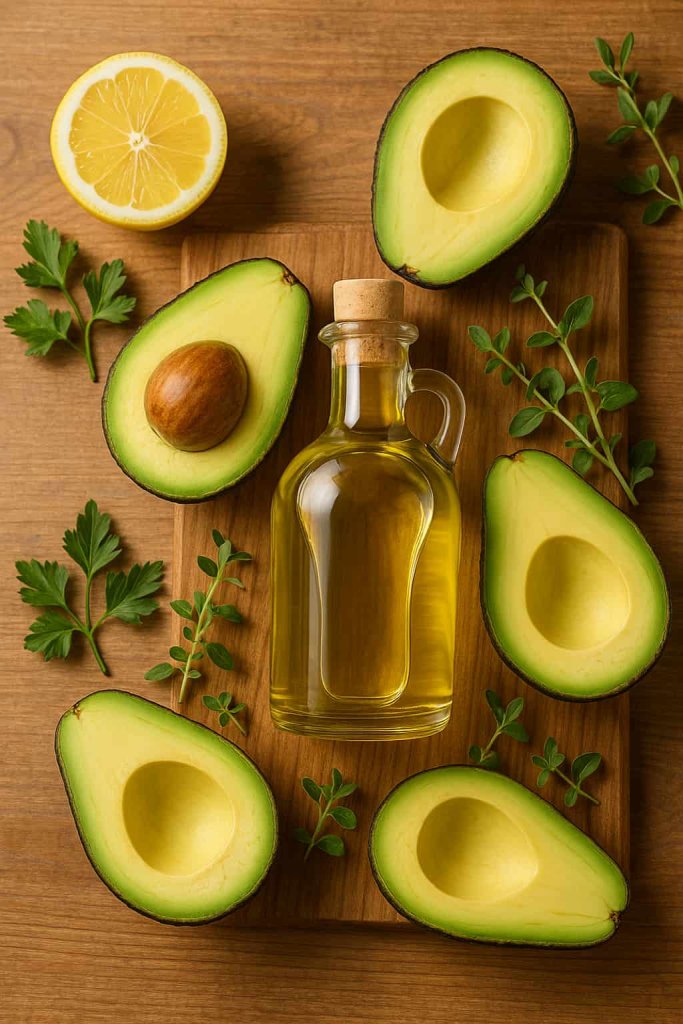
Understanding the health benefits of avocado oil helps you make smarter choices in your diet and lifestyle. Whether you drizzle it over salads, use it for high-heat cooking, or apply it topically, this nutrient-rich oil delivers powerful results inside and out.
In this guide, we’ll explore the 10 amazing, research-backed benefits of avocado oil, how it works in the body, and the best ways to use it safely every day — all supported by findings from trusted sources like the National Institutes of Health (NIH), Harvard Health, and the Cleveland Clinic.
✅ In short: Avocado oil is a versatile, nutrient-dense oil that promotes heart health, glowing skin, and balanced metabolism — a simple addition to your routine with proven, science-backed advantages.
What Is Avocado Oil?
Avocado oil is a nutrient-rich, plant-based oil extracted from the creamy pulp of ripe avocados — not the seed — making it one of the few edible oils pressed directly from fruit.
Unlike seed oils such as sunflower or canola, avocado oil retains a wide spectrum of healthy monounsaturated fats, antioxidants, and vitamins that contribute to its exceptional health profile.
How Avocado Oil Is Made
The oil is typically produced through cold-pressing or centrifugal extraction, where the avocado flesh is crushed and the oil separated without using excessive heat or chemicals.
- Cold-pressed avocado oil preserves more nutrients and has a deep green color due to chlorophyll and carotenoids.
- Refined avocado oil, while lighter in color and flavor, has a higher smoke point (~520°F), making it excellent for cooking.
According to USDA FoodData Central, one tablespoon (≈14 g) of avocado oil provides:
- 124 calories
- 14 g total fat, including about 10 g monounsaturated oleic acid
- Vitamin E (2 mg) — about 13% of your daily value
- Plant sterols, lutein, and chlorophyll that protect cells from oxidative damage
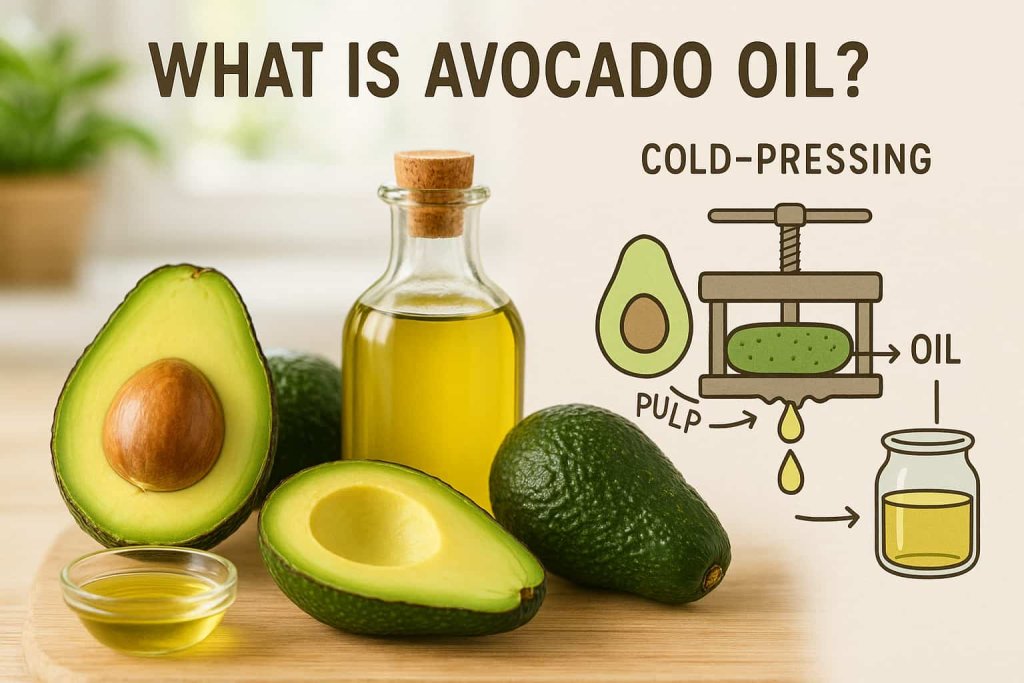
Why It’s Different from Olive or Seed Oils
While olive oil is also rich in monounsaturated fats, avocado oil contains higher levels of lutein and plant sterols, which enhance eye and skin health. It’s also more heat-stable, meaning it retains nutrients during frying or roasting.
Compared with seed oils (like soybean or corn oil), avocado oil is naturally low in omega-6 fatty acids and free from trans fats or chemical solvents. This makes it a cleaner, more stable choice for both heart health and everyday cooking.
Recent studies from the National Institutes of Health (NIH) show that avocado oil’s composition is remarkably similar to that of olive oil, but with added antioxidants such as beta-sitosterol and lutein, giving it unique anti-inflammatory and skin-protective properties.
✅ In short: Avocado oil is a heart-healthy, nutrient-dense oil made from fruit pulp — not seeds — and packed with monounsaturated fats, vitamin E, and carotenoids that support whole-body wellness.
Nutritional Profile of Avocado Oil
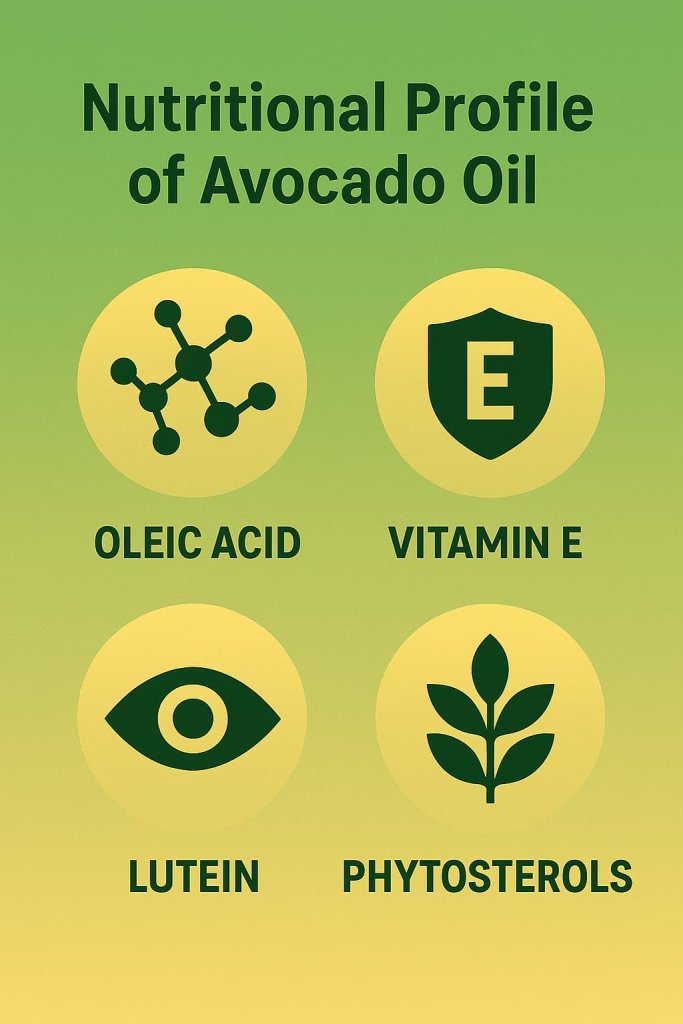
Avocado oil is one of the most nutrient-dense edible oils, rich in heart-healthy fats, vitamin E, and antioxidants such as lutein and phytosterols.
This unique nutrient composition explains many of its science-backed health benefits — from improved heart health and inflammation control to glowing skin and better nutrient absorption.
According to USDA FoodData Central (2024), one tablespoon (14 g) of pure, cold-pressed avocado oil provides the following nutritional values:
| Nutrient | Amount per 1 tbsp (14 g) | Key Health Role |
|---|---|---|
| Calories | 124 kcal | Provides quick, clean energy |
| Total Fat | 14 g | Main energy source; supports cell structure |
| Monounsaturated Fat (Oleic acid) | ~10 g (≈ 70–75%) | Improves heart health, lowers LDL cholesterol |
| Polyunsaturated Fat (Linoleic acid) | ~1.5 g (≈ 10%) | Supports brain and hormone function |
| Saturated Fat | ~1.8 g (≈ 13%) | Maintains cellular integrity (in moderation) |
| Vitamin E (α-tocopherol) | 2 mg (13% DV) | Powerful antioxidant that protects skin and cells |
| Phytosterols (β-sitosterol) | ~95 mg | Lowers cholesterol absorption, supports prostate health |
| Lutein (carotenoid) | ~0.4 mg | Promotes eye health and protects against macular degeneration |
| Chlorophyll & Polyphenols | Trace | Provide antioxidant and anti-inflammatory protection |
| Smoke Point (refined) | Up to 520°F (271°C) | Ideal for high-heat cooking |
Source: USDA FoodData Central; National Institutes of Health (NIH)
Key Nutritional Highlights
- High in monounsaturated fats (oleic acid): Supports cardiovascular and metabolic health.
- Rich in vitamin E: Protects cells from oxidative stress and promotes youthful skin.
- Contains lutein: A potent antioxidant linked to eye and brain protection.
- Loaded with phytosterols: Help block cholesterol absorption in the gut.
- Heat-stable: Retains nutrients even when used for sautéing, roasting, or frying.
A review from the National Library of Medicine (NIH, 2023) confirms that the fatty-acid profile of avocado oil is similar to olive oil but with higher sterol and carotenoid content — giving it both nutritional and functional advantages.
✅ In summary: Avocado oil delivers a rare combination of healthy fats, antioxidants, and micronutrients that make it beneficial for the heart, brain, skin, and overall well-being — while being stable enough for everyday cooking.
10 Amazing Health Benefits of Avocado Oil — Backed by Science
1. Supports Heart Health and Lowers Bad Cholesterol

Avocado oil is one of the best natural sources of oleic acid, a monounsaturated fatty acid also found in olive oil. This “good fat” is known to reduce LDL (bad cholesterol) while increasing HDL (good cholesterol) — a combination that supports long-term cardiovascular health.
Recent findings published in the Journal of Functional Foods (2023) showed that people who replaced saturated fats (like butter) with avocado oil experienced lower triglyceride levels and improved endothelial function, which helps keep arteries flexible and clear.
Additionally, its phytosterols and polyphenols help prevent plaque buildup, reducing your risk of heart attack or stroke.
Tip: Use avocado oil instead of butter, margarine, or refined vegetable oil when cooking — its high smoke point (around 520°F) makes it perfect for sautéing or frying without nutrient loss.
👉 Learn more from Harvard Health on how monounsaturated fats improve heart function and lower cardiovascular risk.
2. Fights Inflammation Naturally

Chronic inflammation underlies many serious conditions — from arthritis and diabetes to heart disease. Avocado oil contains phytosterols, carotenoids, and polyphenolic compounds that help block inflammatory cytokines such as IL-6 and CRP.
Although large human trials are still limited, existing evidence supports its anti-inflammatory potential. For example, one review found that avocado oil’s antioxidant and anti-inflammatory bioactives “help protect cells and reduce oxidative and inflammatory markers in vitro and in animal models.” (see Health.com overview)
These anti-inflammatory effects may help ease joint pain and support those with autoimmune conditions. Regular use — whether through cooking or topical application — helps the body maintain a more balanced inflammatory response.
👉 More information: Health.com — “Avocado Oil Contains Antioxidant and Anti-Inflammatory Plant Compounds”
3. Boosts Nutrient Absorption
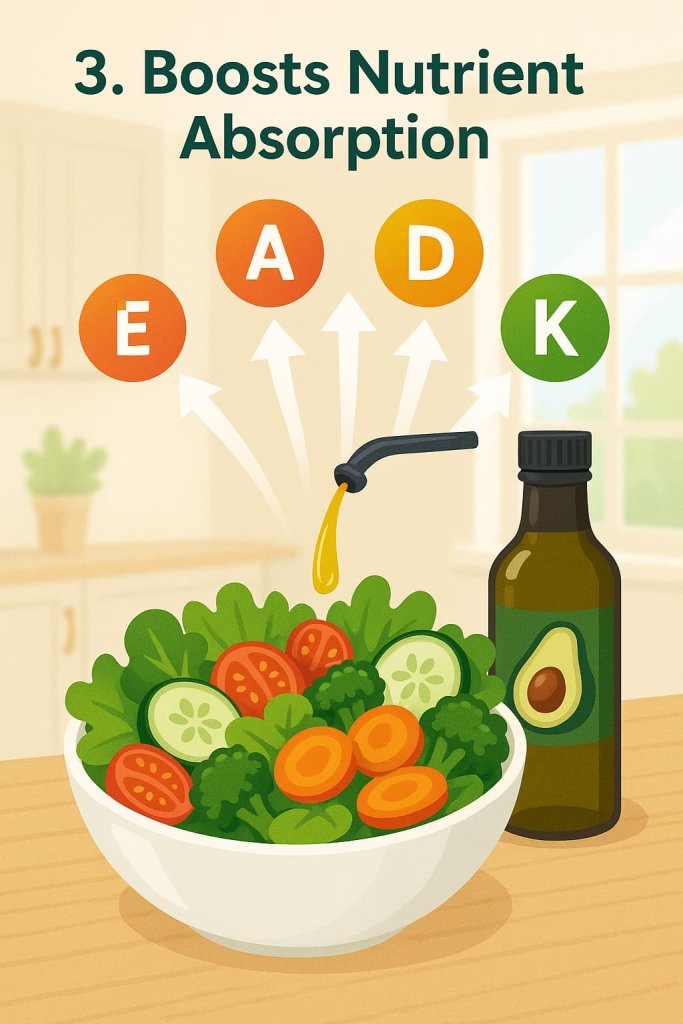
Avocado oil enhances the absorption of fat-soluble nutrients like vitamins A, D, E, K, and carotenoids (the antioxidants in colorful vegetables).
According to a 2024 study published in Food Chemistry, adding avocado oil to salads increased carotenoid absorption by up to 300 percent compared to eating the same vegetables without oil.
That means a drizzle of avocado oil not only adds flavor but also ensures your body actually absorbs the vitamins from your greens.
Best practice: Add 1–2 teaspoons to salads, roasted vegetables, or smoothies. It’s an easy way to maximize nutrient uptake naturally.
4. Nourishes and Protects Your Skin

Avocado oil is one of the most nutrient-rich natural moisturizers for skin, supporting hydration, elasticity, and barrier repair.
It’s loaded with vitamin E, linoleic acid, and beta-sitosterol, which work together to seal in moisture, strengthen the skin barrier, and protect against oxidative and UV damage.
According to a 2024 dermatology review summarized by Verywell Health, avocado oil’s antioxidants and fatty acids may help:
- Reduce dryness and flakiness by replenishing essential lipids in the outer skin layer.
- Stimulate collagen synthesis, improving elasticity and firmness.
- Soothe eczema, psoriasis, and irritation thanks to its anti-inflammatory properties.
- Support wound healing by promoting new tissue formation and reducing oxidative stress.
Dermatologists recommend using cold-pressed, unrefined avocado oil or skincare products formulated with it, as these retain more vitamins and beneficial plant compounds. When applied consistently, it may help maintain soft, resilient, and youthful-looking skin.
👉 Read more: Verywell Health — Avocado Oil Benefits for Your Skin
5. Supports Brain Health and Cognitive Function

Your brain thrives on healthy fats — and avocado oil is full of them. Its monounsaturated fats and vitamin E antioxidants protect brain cells from oxidative stress, which contributes to memory loss and neurodegenerative diseases.
Several population studies link higher oleic acid intake with improved cognitive function and lower Alzheimer’s risk. By reducing inflammation and supporting cell membranes, avocado oil helps maintain brain agility, focus, and mental clarity.
Integrating avocado oil into a Mediterranean-style diet — rich in nuts, fish, and whole grains — can further protect cognitive health as you age.
6. Helps Manage Weight and Satiety

While avocado oil is calorie-dense, it can support weight management by promoting fullness and reducing overeating. The monounsaturated fats and plant compounds in avocado oil help trigger satiety hormones and stabilise blood sugar, which may reduce cravings and fat storage.
For example, reviews report that incorporating healthier oils in place of refined vegetable oils can improve post-meal insulin responses and appetite control—important for long-term body-weight balance. According to Harvard T.H. Chan School of Public Health (Types of Fat and and Health), choosing oils rich in monounsaturated fats supports metabolic health and may aid in maintaining a healthy weight.
Tip: Use 1–2 tablespoons of avocado oil daily instead of processed oils. Pair with high-fibre vegetables, whole grains or legumes for a satisfying, metabolism-friendly meal.
7. Supports Wound Healing and Skin Repair

Avocado oil’s unique blend of fatty acids, sterols, and antioxidants encourages tissue regeneration. Laboratory studies demonstrate that it accelerates collagen deposition and reduces inflammation in injured skin.
Applying it to minor cuts, burns, or post-sun exposure can soothe irritation and support faster recovery.
According to NIH research, the high content of oleic acid and vitamin E in avocado oil enhances wound closure and promotes smoother healing.
8. Improves Blood Pressure and Circulation

Avocado oil may naturally support healthy blood pressure and circulation thanks to its rich concentration of monounsaturated fats, potassium, and folate.
These nutrients help relax blood vessel walls, regulate sodium balance, and enhance nitric oxide production — all of which are vital for cardiovascular health.
According to a 2024 cardiologist-reviewed report by EatingWell, avocado oil’s unsaturated fat profile works similarly to olive oil by promoting arterial flexibility and lowering blood pressure risk when used in place of saturated fats.
Its combination of oleic acid, antioxidants, and micronutrients supports smoother blood flow and reduces oxidative stress in the vascular system.
How to Use for Heart Support:
- Replace butter, margarine, or refined vegetable oils with 1–2 tablespoons of avocado oil daily.
- Combine it with omega-3-rich foods such as salmon, walnuts, or flaxseed to further support vascular health.
- Pair it with potassium-rich vegetables like spinach, kale, or sweet potatoes to help regulate blood pressure naturally.
For best results, choose cold-pressed, unrefined avocado oil — it retains the most antioxidants and beneficial fatty acids for long-term heart and circulation benefits.
👉 Read more: EatingWell – Avocado Oil vs. Olive Oil: Cardiologists Share Which Is Better for Your Heart
9. Supports Joint Health and May Ease Arthritis Symptoms

Avocado oil may help support joint comfort and flexibility — especially for people with osteoarthritis — thanks to its unique compounds called avocado–soybean unsaponifiables (ASU).
These natural plant extracts are known to reduce inflammation, slow cartilage breakdown, and support joint lubrication. Clinical trials published in Arthritis Research & Therapy and Clinical Rheumatology have shown that ASU supplementation can significantly reduce pain and stiffness in patients with knee and hip osteoarthritis compared to placebo groups.
In addition to oral supplements, using avocado oil in daily meals provides smaller but consistent amounts of these protective phytosterols, which may help support long-term joint comfort and mobility.
According to the Arthritis Foundation (2024), avocado oil and other plant-based oils rich in monounsaturated fats are considered anti-inflammatory foods that may help manage arthritis symptoms and improve joint health when part of a balanced diet.
Pro Tip: Choose cold-pressed, unrefined avocado oil to preserve its sterols and antioxidant compounds. Use 1–2 tablespoons daily in salads, soups, or light cooking to support overall joint and cartilage wellness.
👉 Read more: Arthritis Foundation – 12 Best Foods for Arthritis
10. Promotes Healthy Hair Growth and Shine

If your goal is thicker, shinier hair, avocado oil is a strong ally. It’s rich in biotin, vitamin E, and omega-9 fatty acids, all of which nourish the scalp and help reduce hair breakage and dryness.
Massaging warm avocado oil into your scalp improves circulation and delivers nutrients directly to hair follicles. It also helps seal the hair cuticle, repair split ends, and protect against heat and environmental damage. According to Medical News Today (2023), using avocado oil regularly may enhance shine, reduce dandruff, and support healthier hair over time.
Usage tip: Apply a few drops of cold-pressed avocado oil to damp hair as a natural conditioner, or use it as a pre-wash scalp treatment once a week for optimal results.
Best Ways to Use Avocado Oil
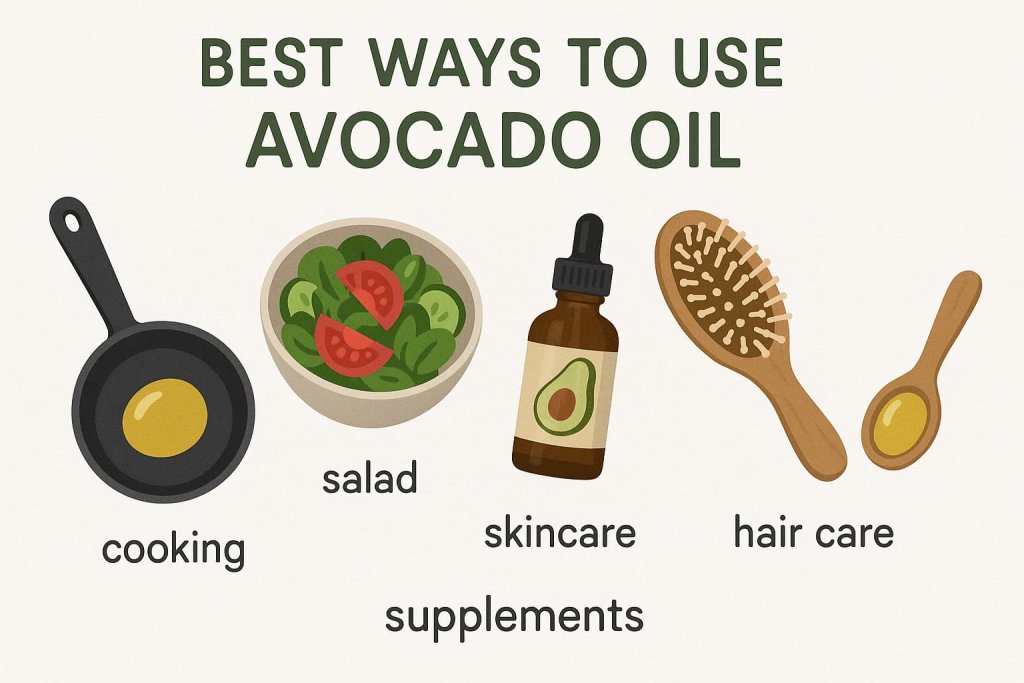
Avocado oil is incredibly versatile — perfect for cooking, skincare, haircare, and even natural supplements.
Its high smoke point and nutrient stability make it one of the safest and healthiest oils to use every day, whether you’re sautéing vegetables or nourishing your skin.
Below are the best ways to use avocado oil for different purposes:
| Purpose | How to Use | Tips & Benefits | Smoke Point / Note |
|---|---|---|---|
| 🥘 Cooking & Frying | Use in place of olive or canola oil for sautéing, roasting, or grilling. | Withstands high heat without breaking down. Retains nutrients and flavor. | Refined oil: up to 520°F (271°C) — among the highest of all cooking oils. |
| 🥗 Salad Dressing & Dips | Mix 1–2 tsp with lemon juice, vinegar, or herbs for a heart-healthy dressing. | Enhances nutrient absorption of vitamins A, D, E, K, and carotenoids. | Cold-pressed oil preferred for raw dishes. |
| 💧 Skincare | Apply directly to clean skin or mix with lotion or aloe gel. | Deeply moisturizes, softens, and supports collagen production. | Non-comedogenic (won’t clog pores). Dermatologist-approved. |
| 💆 Haircare | Massage warm avocado oil into scalp; leave 30 mins before washing. | Strengthens hair, reduces dandruff, and boosts natural shine. | Ideal as a pre-wash or overnight treatment. |
| 💊 Supplements | Take 1 tablespoon (≈14 g) daily, or use in smoothies. | Supports cholesterol balance, brain function, and antioxidant protection. | Use cold-pressed, extra-virgin only. |
Expert-Backed Usage Insights
Avocado oil’s wide-ranging health and beauty benefits are supported by leading medical and nutrition experts. From cardiovascular wellness to skincare and hair nourishment, here’s what research-backed authorities say:
- Heart Health: According to Harvard Health Publishing, replacing saturated fats with oils rich in monounsaturated fats — like avocado oil — helps lower LDL (bad) cholesterol, improve arterial flexibility, and support long-term cardiovascular health.
- Skin Health: Cleveland Clinic experts explain that avocado oil is a rich source of vitamin E, lutein, and phytosterols, which help hydrate dry skin, reduce inflammation, and protect against oxidative damage. Dermatologists often recommend it for sensitive or mature skin due to its natural moisture-retaining properties.
- Hair and Scalp Care: Cleveland Clinic – Healthy Fats Guide notes that oils high in unsaturated fats — such as avocado oil — contribute to stronger, shinier hair by improving scalp circulation and reducing oxidative stress that leads to breakage.
Together, these expert insights reinforce why avocado oil is considered a heart-healthy and skin-nourishing oil suitable for daily use in both cooking and topical routines.
Practical Tips for Everyday Use
- Use refined avocado oil for cooking and cold-pressed oil for dressings and skincare.
- Always store in a cool, dark place to prevent oxidation.
- Combine with lemon juice or vinegar to enhance flavor and nutrient uptake in salads.
- For skincare, test on a small area first to ensure no sensitivity.
- Use within 6 months of opening for maximum freshness.
✅ In summary: You can enjoy avocado oil every day — from your kitchen to your beauty routine. It’s a one-stop wellness oil that supports heart health, skin vitality, and nutrient absorption without sacrificing taste or stability.
Recommended Daily Intake, Safety & Storage
Avocado oil is safe for daily use when consumed in moderation — typically 1 to 2 tablespoons per day.
This amount provides essential monounsaturated fats, antioxidants, and vitamin E without adding excess calories. Consistent, moderate intake supports heart, brain, and skin health while helping maintain balanced cholesterol levels.
Recommended Daily Intake
- General use: 1–2 tablespoons (≈ 14–28 g) per day for cooking, salads, or as a supplement.
- For skincare: A few drops daily on clean skin or mixed into moisturizer.
- For haircare: 1–2 teaspoons applied weekly as a scalp or hair treatment.
- Calorie consideration: Each tablespoon provides about 124 kcal, so factor this into your total daily energy needs.
A balanced intake of healthy fats — including avocado oil — helps your body absorb fat-soluble nutrients and maintain optimal cardiovascular function, as supported by Harvard Health.
⚠️ Safety and Allergy Information
Avocado oil is generally recognized as safe (GRAS) by the U.S. FDA when used in normal food quantities. However, a few precautions apply:
- Allergies: Rare, but individuals allergic to avocados or latex should perform a patch test before topical use.
- Pregnancy & breastfeeding: Safe in dietary amounts, according to Mayo Clinic. Consult a healthcare provider before using as a supplement.
- Medication interactions: No major risks are known, but those taking cholesterol-lowering or blood-pressure medications should confirm compatibility with their doctor.
- Rancidity risks: Avoid products that smell bitter or paint-like — this indicates oxidation.
Research from the University of California, Davis found that up to 82 % of avocado oils on the market were rancid or mixed with cheaper oils, highlighting the need to choose trusted, cold-pressed brands.
Proper Storage Tips
To preserve nutrients and prevent oxidation:
- Store in a cool, dark place away from sunlight or heat.
- Keep the bottle tightly sealed after each use.
- Use dark glass bottles — they protect antioxidants from light damage.
- Shelf life: 12–18 months unopened, and about 6 months after opening.
- Avoid refrigeration if the oil solidifies; simply keep it in a pantry below 25 °C (77 °F).
According to the National Institutes of Health (NIH), vitamin E — one of avocado oil’s main antioxidants — degrades when exposed to heat, light, or oxygen, reinforcing the importance of proper storage.
✅ In summary:
For optimal health benefits, use 1–2 tablespoons of cold-pressed avocado oil daily, store it properly in a dark, airtight bottle, and always buy from reputable brands to ensure purity and freshness.
Frequently Asked Questions (FAQ)
1. Is avocado oil better than olive oil?
Both are excellent sources of heart-healthy monounsaturated fats, but avocado oil has a higher smoke point (up to 520°F) — making it more stable for high-heat cooking.
Olive oil, especially extra-virgin, offers slightly higher antioxidant content.
For best results, include both oils in your diet.
👉 Learn more at Harvard Health — Fats and Heart Health.
2. Can I use avocado oil on my face or skin?
Yes. Cold-pressed avocado oil is rich in vitamin E, oleic acid, and antioxidants that hydrate and repair the skin barrier.
According to the Cleveland Clinic, it helps moisturize dry, sensitive, or aging skin and is non-comedogenic, meaning it won’t clog pores.
Apply a few drops to clean, damp skin or mix with your moisturizer for extra hydration. Always do a patch test if you have sensitive skin.
✅ Informational only — consult a dermatologist for medical skin concerns.
3. Does heating avocado oil destroy nutrients?
Not significantly. Avocado oil is one of the most heat-stable cooking oils thanks to its high monounsaturated fat content and low polyunsaturated fraction.
It retains most of its antioxidants and vitamin E even at moderate-to-high cooking temperatures.
According to the National Library of Medicine (NIH), avocado oil maintains nutritional integrity better than most vegetable oils.
4. Is avocado oil good for weight loss?
In moderation, yes. The healthy fats in avocado oil promote satiety and stable blood sugar, which can help reduce overeating.
A 2023 study in Nutrition & Metabolism found that meals prepared with avocado oil improved appetite control and metabolic health compared to refined oils.
However, it’s still calorie-dense — about 124 calories per tablespoon — so portion control matters.
5. What kind of avocado oil is best to buy?
Choose cold-pressed, unrefined, extra-virgin avocado oil in dark glass bottles.
Avoid products that smell rancid or have no harvest date on the label.
A University of California, Davis study revealed that many store brands were oxidized or adulterated, so always check purity certifications.
6. Can I use avocado oil on my hair?
Yes. Cold-pressed avocado oil helps moisturize the scalp, reduce dandruff, and add shine.
It’s rich in biotin, vitamin E, and omega-9 fatty acids that strengthen hair and protect against dryness.
According to Healthline, applying avocado oil regularly may reduce breakage and support healthy growth.
Massage a few drops into your scalp before shampooing or use on damp hair as a leave-in conditioner.
✅ Informational only — consult a dermatologist or trichologist for ongoing scalp or hair concerns
7. Is avocado oil safe for everyone?
Yes, it’s safe for most people when used in normal food amounts.
However, if you’re allergic to avocados or latex, test a small patch before topical use.
According to the Mayo Clinic, avocado oil is a healthy fat choice for heart and metabolic health, but moderation and quality sourcing are key.
✅ In summary: Avocado oil is safe, versatile, and beneficial for nearly everyone — whether you’re cooking, moisturizing, or improving your overall wellness. Just remember: choose cold-pressed, store properly, and enjoy 1–2 tablespoons daily for the best results.
Conclusion
Avocado oil stands out as one of the most versatile and nutrient-rich natural oils available today. Backed by solid scientific research, it delivers powerful health benefits for your heart, brain, skin, and overall wellness. Rich in oleic acid, vitamin E, and antioxidants, this golden-green oil supports balanced cholesterol, reduces inflammation, enhances nutrient absorption, and keeps your skin and hair glowing with vitality.
What makes avocado oil exceptional is its high heat stability, anti-inflammatory properties, and nutrient synergy — allowing it to nourish your body from the inside out. Whether you drizzle it over salads, cook with it, or apply it topically, avocado oil is a simple, delicious, and science-backed way to elevate your health naturally.
👉 Start incorporating avocado oil into your meals and skincare routine today to experience its full range of proven benefits — from a healthier heart to radiant skin and stronger hair.
References
1️⃣ USDA FoodData Central — Avocado Oil Nutrition Facts
Provides verified nutrient data (fatty acids, vitamin E, calories) used in your “Nutritional Profile” section.
👉 USDA FoodData Central – Avocado Oil
2️⃣ National Institutes of Health (NIH) — Avocado Oil: Composition and Health Benefits
Comprehensive review covering oleic acid, antioxidants, and anti-inflammatory effects; ideal for general health claims.
👉 NIH – Avocado Oil Composition Study (PMC6600360)
3️⃣ Harvard Health Publishing — The Facts on Fats and Heart Health
Supports claims about monounsaturated fats lowering LDL and protecting the heart.
👉 Harvard Health – Fats and Heart Health
4️⃣ ScienceDirect – Food Chemistry (2024): Key Components and Health Functions of Avocado Oil
Backs up your section on nutrient absorption and carotenoid bioavailability.
👉 ScienceDirect – Food Chemistry 2024 Study
5️⃣ University of California, Davis — Study Finds 82% of Avocado Oil Rancid or Mixed with Other Oils
Essential for your “Safety & Storage” section; highlights why product quality and purity matter.
👉 UC Davis – Avocado Oil Quality Study
